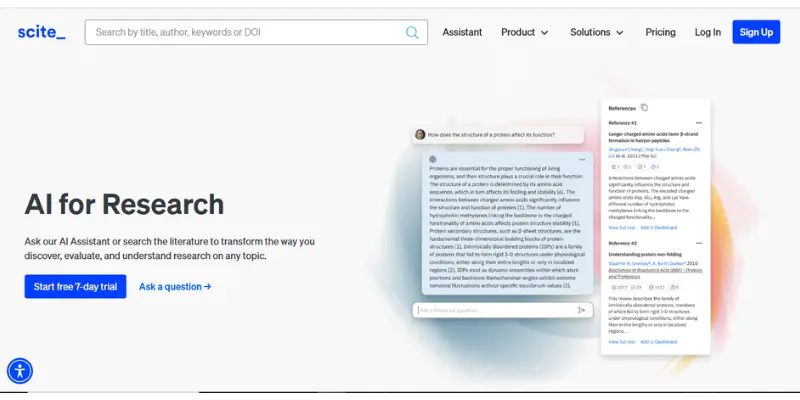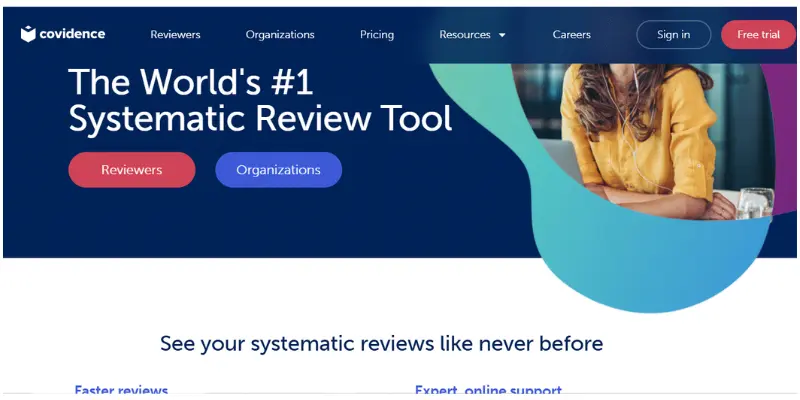Top AI Tools for Literature Review – Save Time & Effort
Published: 02 Feb 2025
Struggling to Sift Through Thousands of Academic Papers? You’re Not Alone!
Research can be overwhelming. Traditional literature reviews take weeks or even months to complete. Finding relevant studies, summarizing key insights, and organizing references can feel like an endless task.
Luckily, the top AI tools for literature review can make this process faster and more efficient. These tools help researchers find the most relevant papers, extract summaries, and organize citations—all in a fraction of the time. Whether you’re a student, academic, or researcher, AI can revolutionize how you handle literature reviews.
Ready to explore the best AI-powered research assistants? Let’s dive in!
How to Use AI for Literature Review: Why Researchers Are Turning to AI
A literature review is a summary of existing research that helps understand key findings, identify gaps, and support new studies. Researchers are turning to AI because it speeds up the review process, improves accuracy, and efficiently organizes vast amounts of data, making literature reviews more effective and manageable.
AI tools help researchers save time by scanning and summarizing papers in minutes, ensuring no key studies are missed. They also reduce errors, select the most relevant sources, and are widely used in academia to enhance workflow. While AI supports human analysis, it does not replace it, making research both faster and more accurate.
Uses of Literature Review
- Helps Researchers Understand Past Studies: It provides insights into previous research and findings.
- Identifies Research Gaps: It highlights areas that need further investigation.
- Supports New Research: It ensures new studies build on existing knowledge.
Best AI Tools for Academic Literature Review
Finding the right AI Literature Review Tools can save researchers time and improve accuracy. Here are some of the Best AI Tools for Academic Literature Review that help streamline research and citations.
a. Elicit – AI Research Assistant

Elicit is an AI-powered research assistant designed to streamline the literature review process. It offers smart AI-based paper summarization and research filtering, allowing users to search, summarize, and extract data from over 125 million papers.
Features:
- Smart Summarization: Elicit provides structured summaries of research papers, highlighting key findings and insights.
- Research Filtering: It allows users to filter research based on specific criteria, ensuring the most relevant studies are prioritized.
Benefits:
By extracting key insights instantly, Elicit saves researchers hours that would otherwise be spent reading through entire papers. This efficiency enables a more focused approach to literature reviews.
Real-Life Example:
Torben Riise, a PhD biotechnologist and consultant, praised Elicit for its ability to quickly surface interesting research findings that might have been missed through traditional search engines.
Elicit is trusted by over 2 million researchers in academia and industry, highlighting its effectiveness in enhancing research efficiency.
b. ResearchRabbit – AI Literature Discovery

ResearchRabbit is an AI tool that helps researchers discover academic papers by generating connections between studies. It provides a visual network of related research, making it easier to explore new literature and track relevant studies.
Features:
- AI-Generated Research Connections: ResearchRabbit uses AI to suggest relevant papers based on your research interests, helping you discover new studies that align with your work.
- Visual Network Mapping: It provides interactive visualizations of research papers and co-authorship networks, allowing you to see how studies and authors are interconnected.
Benefits:
By automatically tracking related studies, ResearchRabbit ensures you stay updated with the latest developments in your field without manual searching.
Real-Life Example:
A professor utilized ResearchRabbit and discovered over 30 new relevant research papers within minutes, significantly enhancing their literature base.
c. Scite – AI-Powered Citation Analysis

Scite is an AI-based citation analysis tool that evaluates the credibility and impact of academic papers. It helps researchers determine whether a paper is highly cited, disputed, or has supporting and contrasting references.
Features:
- Citation Context Analysis: Scite analyzes how papers are cited, indicating whether a study supports, contradicts, or merely mentions another, providing deeper insights into its impact.
- Advanced Search Tools: It offers filters to quickly find key studies based on citation type or relevance, streamlining the research process.
Benefits:
Scite helps researchers assess the credibility of papers by identifying whether a study is highly cited or disputed, ensuring the use of high-quality references.
Real-Life Example:
Researchers employed Scite to filter out low-quality references, enhancing the reliability of their literature reviews.
d. Zotero – AI-Enhanced Citation Manager

Zotero is an AI-powered reference management tool that helps researchers organize, store, and cite academic papers. It integrates with web browsers to save sources and automatically format citations in various styles.
Features:
- Smart Organization: Zotero automatically organizes your research materials, tagging and categorizing them for easy retrieval.
- Browser Integration: With browser extensions, you can save citations directly from web pages into your library.
Benefits:
Zotero keeps your research organized and makes citing sources straightforward, saving time during the writing process.
Real-Life Example:
A PhD student managed over 500 references effortlessly using Zotero, streamlining their dissertation writing process.
e. Covidence – AI Systematic Review Tool

Covidence is an AI-driven platform that streamlines systematic literature reviews by automating data extraction, study selection, and collaboration. It is widely used in medical and academic research to handle large-scale reviews efficiently.
Features:
- Automated Data Extraction & Study Selection: Covidence automates the screening and data extraction process, making systematic reviews more efficient.
Benefits:
It speeds up systematic reviews for large studies by handling extensive data efficiently.
Real-Life Example:
A medical researcher used Covidence to review over 1,000 studies in weeks, significantly reducing the time required for their systematic review.
Incorporating these AI tools into your research workflow can save time, improve accuracy, and keep your work organized, ultimately enhancing the quality of your literature reviews.
How to Use AI for Literature Review
Conducting a literature review can be time-consuming. However, AI tools can streamline this process. Here’s how to effectively use AI for your literature review:

Step 1: Choose the Right AI Tool
Identify your specific needs—whether it’s summarization, citation management, or literature discovery. Select an AI tool that aligns with these requirements. For instance, if you need assistance with summarizing research papers, consider using Elicit.
Step 2: Import Research Materials
Upload your research papers or input relevant keywords into the chosen AI tool. This allows the AI to analyze and process the information pertinent to your study.
Step 3: Analyze and Summarize Findings
Utilize the AI tool to summarize key findings, identify research gaps, and suggest additional references. This step aids in synthesizing the information efficiently.
Step 4: Organize Citations
Employ citation management tools like Zotero or Mendeley to keep your references organized. These tools assist in managing citations and integrating them into your writing seamlessly.
Step 5: Review AI-Generated Insights
Carefully review the insights provided by the AI tool to ensure accuracy and relevance. Make necessary adjustments before finalizing your literature review.
By following these steps, you can effectively leverage AI tools to enhance the efficiency and quality of your literature review process.
For advanced details on How to Use ChatGPT for Literature Review visit our step-by-step guide https://toolifiedai.com/how-to-use-chatgpt-for-literature-review/
Pros and Cons of Literature Review
Here’s a quick comparison of the pros and cons of literature review:
| Pros | Cons |
|---|---|
| Expands knowledge and understanding | Time-consuming process |
| Identifies research gaps and opportunities | Risk of bias in study selection |
| Prevents duplication and wasted effort | Limited access to some studies |
| Strengthens arguments with credible sources | Outdated research may mislead |
| Provides theoretical and methodological guidance | Information overload and complexity |
Common Mistakes and Expert Tips
When utilizing AI tools to write literature reviews, it’s essential to be aware of common pitfalls and follow expert advice to ensure a high-quality outcome.
While AI literature review tools can efficiently summarize and organize information, depending entirely on them without cross-referencing can lead to inaccuracies.
Tip: Always cross-check AI-generated data with reliable academic sources to confirm the validity of the information.
Incorporating outdated studies can compromise the relevance of your literature review.
Tip: Set filters within your AI tools to focus on recent papers, preferably from the last five years, ensuring your research remains current.
Not fully understanding the capabilities and limitations of your AI tools can result in suboptimal use.
Tip: Invest time in learning and training on your chosen AI literature review tools to maximize their benefits and enhance your research efficiency.
FAQs on AI for Literature Review
Yes, several AI tools like Elicit, ResearchRabbit, and Scite help with literature reviews by summarizing research papers, finding relevant studies, and organizing citations.
The best AI depends on your needs. Elicit is great for summarizing papers, Scite analyzes citations, and Zotero manages references efficiently.
AI tools like Covidence and ResearchRabbit assist in reviewing literature by analyzing studies, extracting key insights, and identifying research gaps.
Yes, ChatGPT can summarize research papers, generate outlines, suggest sources, and help structure your literature review efficiently.
Yes, ChatGPT can analyze a paper’s structure, readability, and coherence. However, always verify its insights with credible sources.
ChatGPT can help structure a systematic review, summarize studies, and suggest sources, but it should be used alongside AI research tools like Covidence for accuracy.
Use ChatGPT to generate an outline, draft sections, refine language, and summarize key points. For citations and accuracy, combine it with tools like Zotero.
Microsoft Copilot can assist with summarizing research and drafting content, but it lacks specialized academic database access like Elicit or Scite.
Yes, apps like Elicit, ResearchRabbit, and Scite help automate literature reviews by finding and summarizing relevant studies.
AI helps researchers find relevant papers, summarize findings, analyze citations, and organize references, making literature reviews faster and more accurate.
Conclusion
Integrating AI-powered tools into your research can significantly expedite and enhance the accuracy of literature reviews. These tools assist in efficiently navigating complex databases, identifying key studies, and summarizing findings, thereby streamlining the research process.
If you haven’t explored AI literature review tools yet, now is the perfect time to start! Embracing these technologies can lead to more comprehensive and insightful research outcomes.
Which AI tool do you use? Share your experiences in the comments below!

- Be Respectful
- Stay Relevant
- Stay Positive
- True Feedback
- Encourage Discussion
- Avoid Spamming
- No Fake News
- Don't Copy-Paste
- No Personal Attacks

- Be Respectful
- Stay Relevant
- Stay Positive
- True Feedback
- Encourage Discussion
- Avoid Spamming
- No Fake News
- Don't Copy-Paste
- No Personal Attacks





